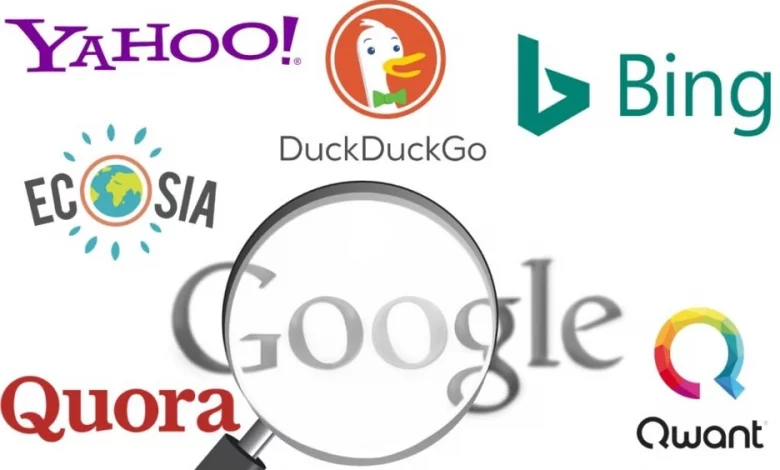
What is a search engine? A search engine is a web application making it possible to find relevant results responding to a request from an Internet user, made in the form of keywords. The results can be in the form of a web page, an image, a video or even a commercial offer. The search engine simplifies navigation and the search for information. They have become essential.
Google is the reference internet search engine for all SEO experts. Indeed, by concentrating more than 90% of the market shares. Whatever the browser (Google Chrome Mozilla Firefox, Safari…) or the device, the American giant is the most popular. However, you might be interested in discovering a new search engine that allows you to search and obtain the same or very similar result. Each tries to differentiate itself by focusing on Google’s weaknesses, sometimes with original ideas such as planting trees, for example. Here is a list of the most notable search engines and research tools.
Google benefits from 90% of global queries but two other players, Bing and Yahoo!, rely on a search engine with a good user experience and above all a wide choice of features and tools.
Are you looking for a search engine that is not Google? Here are 12 search engines you can try instead.
If you don’t like seeing too many ads or sponsored links, or if you’re worried about your privacy, these alternatives might help. Some search engines focus on protecting your privacy and showing results without bias.
These alternatives are made to reduce problems like censorship, data collection, and too many ads. They care more about the users than making money.
Want to try something new? Here are some of the best alternative search engines for you.
Here is a list of the best-known alternative search engines to Google:
- Bing : Historical search engine developed by Microsoft since 1998 (MSN Search), 2nd largest search engine in France after Google
- Yahoo! : Very complete search engine with unique features
- DuckDuckGo : “The search engine that doesn’t spy on you” according to its developers
- Ask
- Aol
- Baidu
- Yandex
- Dogpile
- Excite
- Qwant : French search engine that has been focusing on data protection since 2011
- Ecosia : A German search engine that is committed to the environmental cause
- StartPage by ixquick: A web metasearch engine that protects your privacy
- Lilo : A philanthropic search engine that redistributes its income to Internet users
- Quora : A question-and-answer engine enriched by the collaborative system
- Xaphir : French search engine (acquired by Qwant)
- Yippy : Search engine that sorts the results into folders according to the needs of the user
Table of Contents
1 – BING: SEARCH ENGINE BY MICROSOFT
Bing is a search engine made by Microsoft. It helps you find information on the internet, just like Google. Bing is easy to use and can search for things like text, pictures, videos, and maps.
Bing was first launched in 2009 to replace an older search engine called Live Search. Since then, it has become a popular choice for millions of people around the world.
In 2023, Microsoft added a special AI tool called “Co-pilot” to Bing. This tool helps make search results more personal for each user. Bing also uses powerful AI from OpenAI, which makes it smart and efficient.
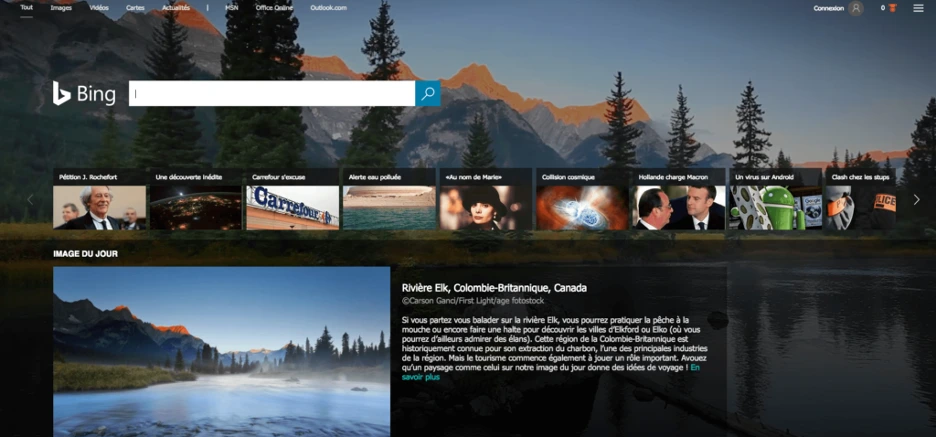
Features –
- Web search: You can search for anything on the internet like news, blogs, images, videos, and maps.
- Deep Search: This helps find detailed answers to difficult questions.
- Privacy: Bing keeps your information safe and doesn’t track your browsing history.
- Copilot: The AI can help you write poems, essays, songs, or even help with math and coding.
- Image, video, and news search: Bing lets you find images, videos, and news from many sources.
- Maps and directions: It gives you detailed maps and directions for driving, walking, or public transport.
- Translation: Bing can translate text or websites into different languages.
- Personalization: Bing can remember your search history and set your preferences for language and location.
- Mobile apps: Bing is available on iPhones and Android phones.
- Integration with Microsoft: Bing works well with other Microsoft products like Office, Windows, and Xbox.
2 – YAHOO! : A VERY COMPLETE SEARCH ENGINE
Yahoo! is a website where you can search for information on the internet. It was started in 1994, before Google. Today, Yahoo! uses Bing to help with search results, since it no longer has its own search tool. Besides searching, Yahoo! also offers other services like news, email, and shopping, all in one place.
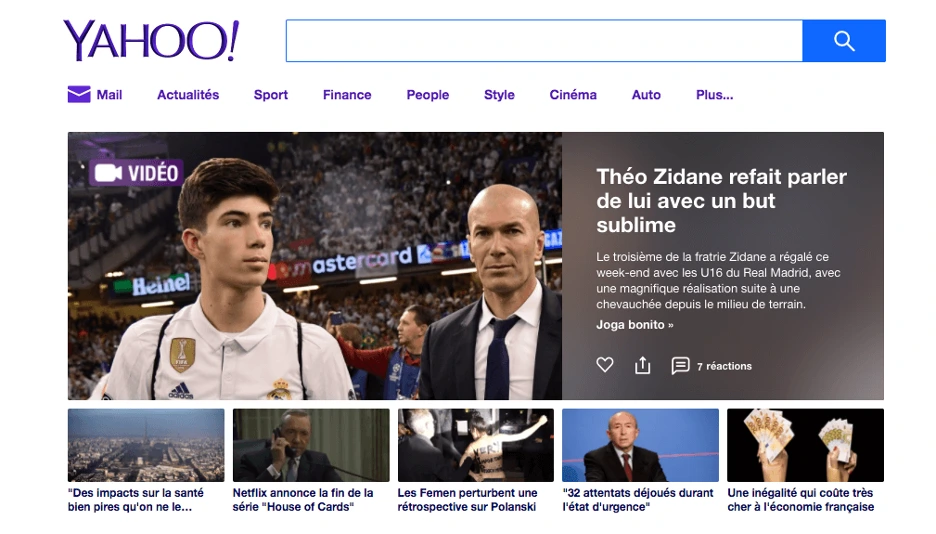
Features –
- Yahoo Search: You can use it to search for websites, images, and videos on the internet.
- Privacy: Yahoo! works to keep your information safe and private.
- Yahoo Mail: This is Yahoo!’s email service. You can send and receive emails, organize your inbox, and protect against unwanted messages (spam).
- Yahoo News: You can read the latest news from around the world, with updates on many different topics.
- Yahoo Finance: It provides news and information about the stock market and business.
- Yahoo Sports: You can get the latest sports scores, news, and stats for many different sports.
- Yahoo Entertainment: It shows you news about movies, TV shows, and celebrities.
3 – DUCKDUCKGO: LONG LIVE THE PROTECTION OF PERSONAL DATA
DuckDuckGo is a search engine from the USA that cares about your privacy. Unlike Google, it doesn’t track your searches or personal information. It shows you results from many sources, like DuckDuckBot, Wikipedia, and Bing, to give you good answers.
Features –
- Privacy Protection: DuckDuckGo doesn’t track your searches, and it doesn’t show ads based on what you’ve searched.
- Encrypted Connections: Your data is safe because it is protected from being seen by others while you search.
- Anonymous Searching: You can search without anyone knowing what you’re looking for. It’s good for private browsing.
- Smarter Search: DuckDuckGo uses its own system to give you relevant search results and quick answers to common questions.
- Customization: You can change how DuckDuckGo looks, like switching to dark mode or setting it for your region.
- Mobile App: DuckDuckGo has an app for phones, so you can stay private while searching on the go.
- Browser Extension: There’s also an extension for your browser to block trackers and protect your privacy while browsing the web.
4. Ask
Ask is a search engine where you can find information by asking questions. It is different from other search engines like Google, which focus on keywords. Instead, Ask lets you search using regular questions, like “Where is the nearest grocery store?”
Features –
- Natural Language Search: You can ask questions in everyday language, not just use keywords. For example, you can type “What is the weather like today?” and Ask will try to give you an answer.
- Search Categories: You can search for specific topics like news, sports, or entertainment. This helps you find exactly what you need more easily.
- Search Filters: You can narrow down search results by factors like date, location, or language to make your search more specific.
- Ask an Expert: If you have a specific question, you can ask experts in different areas to get detailed answers.
- Personalization: You can save your search history, set preferences, and create a profile to make your search experience better.
- Mobile App: Ask also has a mobile app, so you can search on your phone or tablet. It includes features like voice search and notifications to make searching easier.
5. AOL
AOL, which used to be called America Online, is now owned by Yahoo! Inc. It helps people search the web for things like images, videos, shopping, and maps. AOL only has a small share of the market, and it gets its search results from Google and Bing. AOL has been around for a long time and was very popular in the 1990s and 2000s. Today, it offers many services, especially in advertising and digital media.
Features
- Email: AOL gives you a free email account with features like sorting, blocking junk mail, and customizing the look.
- News: AOL shows both local and worldwide news.
- Entertainment: It provides news about music, movies, celebrities, and TV shows.
- Lifestyle: AOL talks about topics like food, health, home, gardening, and travel.
- Search: AOL has a search engine to find websites, articles, pictures, and videos on the web.
- AOL Mobile: You can use AOL on your phone with apps for iOS and Android. It also has desktop software for computers.
- AOL SafeSocial: A tool that helps parents keep their kids safe online by allowing them to monitor social media activity.
- AOL Shield: This tool helps protect your privacy and security online with features like blocking tracking and a built-in VPN.
6. Baidu
Baidu is a search engine from China, similar to Google. It helps people find information on the internet by typing in words or phrases. Baidu is used by many people in China, where it holds more than half of the search engine market. It also works for people who speak Mandarin.
Features –
- Search: You can look up information online by typing words.
- Mapping: Baidu gives maps and helps with directions and location sharing.
- Translation: It can translate text and websites from one language to another.
- Social media: Baidu has a site called Tieba where users can talk about different topics.
- Advertising: Businesses can use Baidu to show ads to many people.
- Mobile Apps: Baidu offers apps for search, news, music, and more.
7. Yandex
Yandex is a search engine from Russia. It helps people find information on the internet, like websites, news, and images. Yandex is known for giving good and accurate search results. It is easy to use and offers many different services.
Features –
- Search Engine: You can search for websites, news, images, and other things.
- Maps: Yandex shows maps of places with details about them.
- Email: You can use Yandex for email with features like blocking junk mail, changing the look of your email, and connecting with other apps.
- Storage: You can save and share files and documents online.
- Translation: Yandex can translate text and websites from one language to another.
- Advertising: Yandex helps businesses show ads to the right people online.
8. Dogpile
Dogpile is a search engine that looks at many other search engines like Google, Yahoo, Yandex, and Bing, and shows all their results in one place. This way, you get a lot of information from different sources in a single list. It’s a good choice for people who want to search easily.
Features –
- Metasearch: Dogpile shows combined search results from different search engines all in one list. You can also search for news, images, and videos.
- Result filtering: You can filter search results by date or how relevant they are to your search.
- Keyword suggestion tool: Dogpile gives suggestions on words or phrases that might help you find better search results.
- Privacy protection: Dogpile keeps your search history private and doesn’t track you. You don’t need an account to use it.
9. Excite
Excite is a website where you can search for information, similar to Google. It has many helpful features:
Features –
- Web Search: You can search for information on websites and web pages.
- News and Image Search: You can also search for news stories and pictures.
- Directory: Excite has a list of websites organized into groups, like business, entertainment, and more.
- Personalization: You can change your homepage to fit what you like, get news that interests you, and make your own search settings.
- Email: You can create a free email account with Excite. You just need an existing email account to get started.
10. Startpage BY IXQUICK: “THE MOST CONFIDENTIAL” SEARCH ENGINE
Startpage is a search engine from the Netherlands that gives you Google search results, but with privacy. It does not track or store your personal information. You get the accuracy of Google’s results, but your privacy is protected. This makes Startpage a great choice for those who care about privacy.
You can use Startpage on your computer with a browser extension or on your phone with an app for Android and iOS.
Features –
- Anonymous Search: Your searches are private. No one tracks you or your data.
- Privacy Protection: Startpage doesn’t collect or share your personal information. Your search is also encrypted for extra privacy.
- No Personalized Results: The search results are only based on what you type, not on your past searches.
- Clean Interface: The website is simple and easy to use.
- Versatile Search: You can search for websites, images, videos, news, and maps.
- Proxy Service: You can view websites without revealing your identity.
11. Ecoasia: THE ECOLOGICAL SEARCH ENGINE
Ecosia is a search engine from Germany. It is special because it uses 100% clean energy and spends all its profits on things that help the environment, like planting trees. Ecosia does not track what you search or save your personal information, so it keeps your privacy safe.
Ecosia has its own browser that you can use on computers, phones, and tablets. You can also add Ecosia to other browsers like Chrome or Firefox. Using Ecosia is safer than many other search engines.
Features –
- Search the web: You can search for information using words or phrases.
- Search images and news: Ecosia shows pictures and news stories about many topics.
- Browser extension: You can add Ecosia to browsers like Chrome, Firefox, Safari, or Edge to make it easier to use.
12. Qwant: THE “FRENCH GOOGLE” THAT WANTS YOU WELL
Qwant is a search engine like Google, but it focuses on keeping your information private. It does not track what you do online. It also helps keep children safe by blocking inappropriate content. Qwant cares about the environment and tries to use green energy to power its servers, which helps reduce pollution.
Features –
- Privacy: Qwant doesn’t collect or store your personal data. It doesn’t track you or show you personalized ads. It also has a feature called “SafeSearch” to protect children.
- Search Accuracy: It uses special technology to understand what you’re looking for and give the best results.
- Multilingual Support: You can search in many languages like French, German, Italian, and English.
- Social media: You can link your social media accounts to Qwant for a more personalized search.
- News: You can find news and trending topics related to your search.
- Images and Videos: It has separate sections for searching images and videos.
- Music: You can listen to songs and explore artists and albums.
- Shopping: It shows products from different online stores, so you can shop directly from the search results.
13 – LILO: THE SOLIDARITY SEARCH ENGINE
In the same vein as Ecosia, we find the French Lilo who uses the money collected to reinvest it in solidarity, social or environmental projects. Each search allows you to accumulate a drop of water. Users can then allocate their credit in drops of water transformed into real money to the project of their choice.
14 – QUORA: A COLLABORATIVE SEARCH ENGINE

Quora is a search engine based on the questions and answers of Internet users. The community comes to enrich a very important database and ordered by subject or theme. The site which is positioned between the search engine and an online encyclopedia claims 100 million unique users per month.
Search engines different from Google
15 – XAPHIR: THE DIFFERENT SEARCH ENGINE
Xaphir is a rather special search engine. Indeed, Google will seek to display results whose order (Page Rank) is defined by algorithms according to specific criteria. Xaphir works on the same principle but it will ask the Internet user several keywords to refine his search. In addition, the popularity of the site does not come into play. A very popular site will not be displayed in priority.
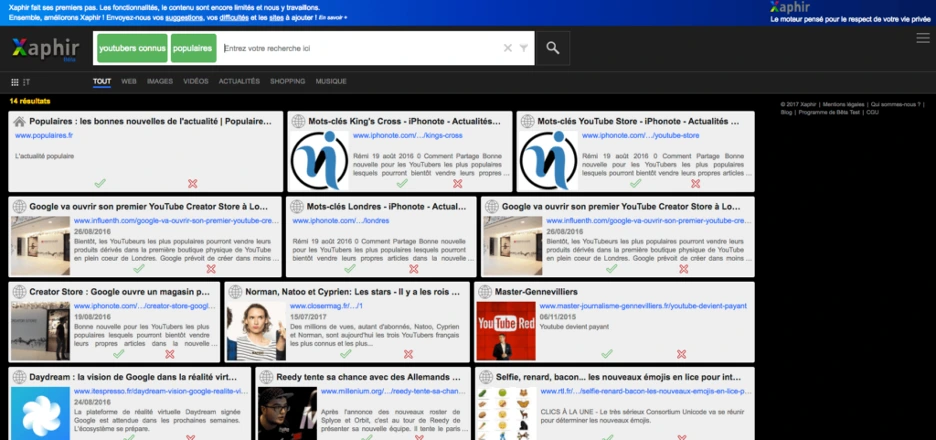
This French beta search engine tries to make us discover other websites that everyone consults almost mechanically. A way to improve your navigation? Maybe, but he quickly shows these limits.
16 – YIPPY: THE “CLUSTERING” SEARCH ENGINE
Yippy is one of the few search engines that practices clustering, the partitioning of data. Each result, each indexed page is analyzed and gathered with others, according to its content. Homogeneous subsets are created. This is done in the form of a list (to the left of the SERP) which allows the results to be segmented.
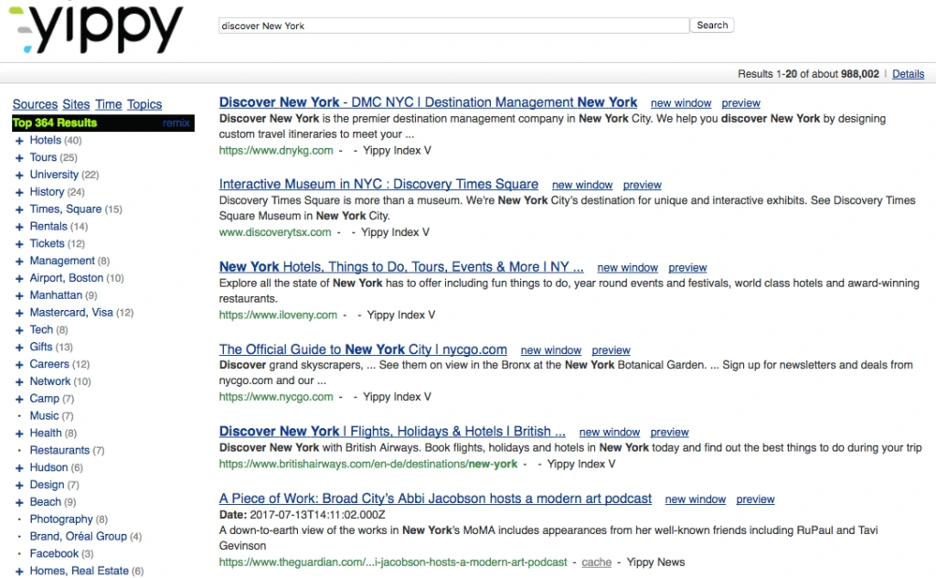
The best search engine
Impossible to make a list of search engines without making a small selection and answering the following question: What is the best search engine? I think the answer will depend on each person. Aspirations, needs and browsing habits are unique to everyone. This will result in a different choice.

In my opinion, the best search engines are:
- Google: For its incredible ability to find the answer quickly and its ability to understand our needs and expectations. It is quite simply the most efficient, the most functional and the most complete. It’s almost a web within a web, useful information can be found even before clicking on a site.
- Qwant: Because it allows you to browse and get answers without being spied on. When we know what Google does with our personal data, it’s a real asset. In addition, its pedagogical scope is very interesting for the young population who are not helpless in the face of the excesses of the web.
- Xaphir (In a few years): Because his idea of offering less popular websites is very interesting. Hundreds, thousands of sites would surely benefit from being better known. Xaphir will probably help us do this when his algorithm becomes more efficient.
Search engine market shares in 2021
To realize Google’s lead over alternative search engines; it is necessary to ask the question “What are the market shares of search engines in 2021, in France?” These data are made public by Global Stats Counter, a site specializing in the analysis of real-time data on the web.
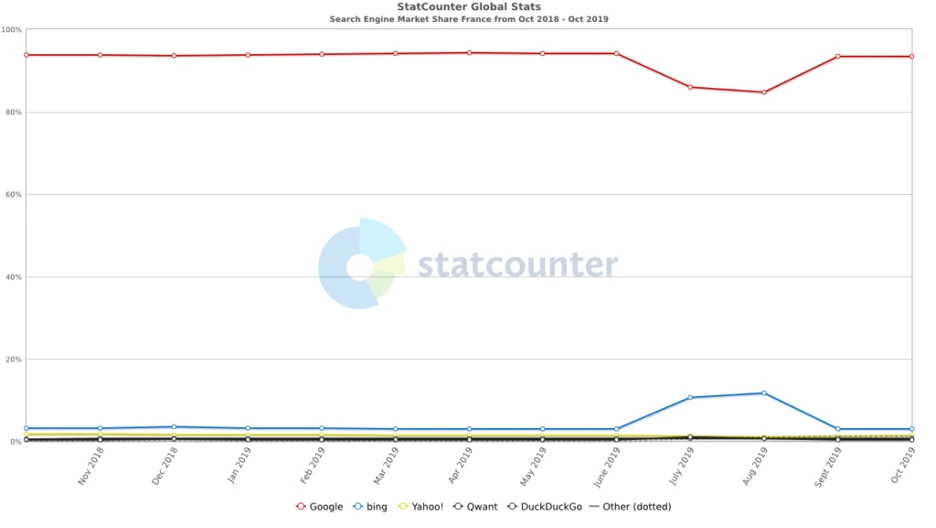
- Google market share: 91.99%
- Bing market share: 3.77%
- Yahoo market share: 1.36%
- DuckDuckGo market share: 0.51%
- Qwant market share: 0.98%
- Ecosia market share: 1.11%
If Google’s reputation is based on its search engine and its market shares are huge compared to the competition, some competitors have decided to take the American giant on the wrong foot. This strategy can be effective with a strong algorithm that can compete with Google. What is certain is that Google will not be endangered for years. So, to position yourself on the first page, you will have to follow Google’s SEO rules. You have been warned!







